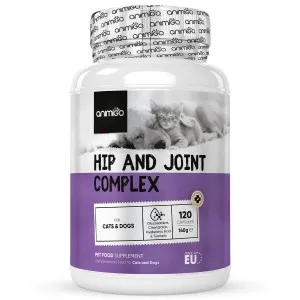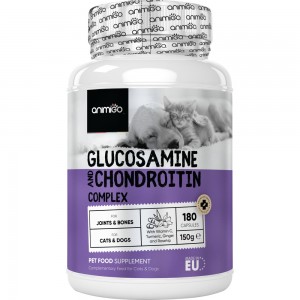100% Customer Satisfaction
Full 90-day money back guarantee
Free UK Delivery
Enjoy free shipping on orders above £30
Natural & Delicious Pet Supplements
Get nutritious, pet-safe & cruelty-free solutions
Filters
Cats
What are the signs of joint issues in cats?
Is your cat usually active but is starting to find it difficult to jump around as they normally would? Or do they just stay in the house all day instead of going out exploring? Joint pain in cats is not necessarily a sudden thing, but usually a slow progressive issue that gets worse with time and age. As a result, you may not realise at first, but the initial sign is a reduction in their normal activity levels. Other signs of cat joint issues include walking stiffly, limping, trouble moving and even lameness, which is when your cat stands strangely because of joint dysfunction.
What causes joint pain in cats?
Joint problems can generally be split into two different categories for both people and cats alike: developmental and degenerative. As the name suggests, developmental is when the bones and joints don’t develop correctly when growing, either as a kitten or a young cat. On the other hand, degenerative means that the bones, joints or ligaments have slowly degraded over time, which is most commonly seen in adult cats. Although each feline is different, there are some common reasons for this, including accidental damage, weight gain, age and general wear and tear.
What is cat arthritis?
Meaning ‘inflammation of the joints’, arthritis can happen in cats, people and most species of the animal kingdom. In a healthy cats’ joint, the bones’ surface is covered over with a thin layer of smooth cartilage in addition to cushioning joint fluid which allows the two surfaces to easily glide over each other without any friction. When a cat has arthritis, however, the cartilage within the joint is damaged, meaning that the two surfaces are rubbing against each other which leads to stiffness, discomfort and pain.
Taking your cat to the vet is a good way to confirm if they’re suffering from arthritis, but if you’ve noticed joint issues only just starting in your cat, there may be things to help before it gets too serious. Arthritis is a result of the joints being eroded to such an extent that it causes permanent damage, but if it hasn’t quite reached that stage, there is plenty of good joint care for cats out there that can act as a preventative measure.
How to help your cat’s joints
When it comes to helping your cat’s joints, there are two routes to take: surgical or natural methods. If you think their joint issue is serious, then first take them to the vets before deciding. They will be able to give them a full check and let you know what the issue is and how to help. From there you can pick one of the two methods. For some, surgery is the only option, however for the majority, trying natural methods first is a better option before resorting to serious and expensive surgery.
Before going down the route of surgery, there are thankfully a number of things to try. To start with, it’s important to identify what the cause of the issue is so that you can provide the right joint care for cats to help. If it is due to weight gain, you can try to alter their diet and up their exercise. If it is due to wear and tear, you can try reducing their activity levels and keeping them busy in ways that won’t impact their joints as much. If the issues are due to old age, unfortunately, there is not much you can do about time, but there are still actions you can take to help. This can involve providing them with specific cat food for older felines or putting all they need, such as their food, beds and toys, on a lower level that is easier to get to.
Natural joint care for cats
In addition to doing what you can to reduce the cause of the issue, you can also try providing other types of care. Natural joint supplements for cats can be extremely beneficial as they can give all the nutrition needed for healthy joints. You can often find these in different variations depending on need, including in pills, powder and soft chews for those fussier felines as well as with different combinations of ingredients. Joint supplements for cats can also be greatly useful for adding something extra to their diet as a preventative measure against future joint issues.
Bone and joint care nutrition
Within many natural joint care supplements for cats, as well as specific pet foods, there are a number of ingredients to look out for that are known to help support healthy bones and joints. The first of these are healthy fats such as Omega 3 and 6 fatty acids that are found in fish oils and foods such as flaxseeds. In addition to this, glucosamine and chondroitin are excellent compounds for healthy bones and joints and play a role in their smooth movement. Other great foods include turmeric and ginger which are said to act as anti-inflammatory agents. It is also important for joint, as well as general, health to make sure your furry-friend is getting plenty of vitamins and minerals into their daily diet either through food or supplementation in order to provide the best joint care for cats.
In conclusion, the optimal way to provide the best joint care for cats of all ages is to firstly monitor their behaviour and movement to see if any issues may be occurring. If you think something may be wrong, do what you can to reduce the cause and take them to the vet if you think it could be serious. Finally, be proactive and take preventative measures to stop issues happening in the first place! The ideal way to do this is through providing them with good nutrition through food or natural joint supplements for cats.




